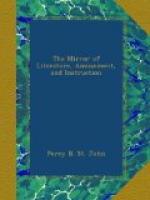The Plum.—The lowest grade of this class of fruits is the almost useless sloe in the hedge; and none but those in some degree acquainted with the matter could, on beholding the acidous, puny sloe, and the ample, luscious magnum bonum plum, together, readily believe that they were kindred, or that the former was the primitive representative of the latter. The intermediate links of this connexion are the bullace, muscle, damacene, &c., of all which there are many varieties. In nurserymen’s lists, there are many improved sorts, not only excellent plums, but excellent fruit,—the green gage and imperatrice are admirable.
The Pear, was originally an inhabitant of European forests: there it grew to be a middle-sized tree, with small leaves, and hard, crude-tasted, petty fruit: since its introduction and naturalization in the orchard, it has well repaid the planter’s care. The French gardeners have been long celebrated for their success and indefatigable perseverance in the cultivation of the pear; almost all our superior sorts are from that country. The monastic institutions all over Europe, but particularly in France, were the sources from whence flowed many excellent horticultural rules, as well as objects.
(To be concluded in our next.)
* * * * *
THE MONTHS
[Illustration: OCTOBER.]
On the woods are hung
With many tints, the fading livery
Of life, in which it mourns the coming
storms
Of winter.
PERCIVAL.
Change is the characteristic of the month of October; in short, it includes the birth and death—the Alpha and Omega—of Nature. Hence, it is the most inviting to the contemplatist, and during a day in October, the genius of melancholy may walk out and take her fill, in meditating on its successive scenes of regeneration and decay.
Dissemination, or the sowing of seed, is the principal business of this month in the economy of nature; which alone is an invaluable lesson, a “precept upon precept” to a cultivated mind. This is variously effected, besides by the agency of man; and it is a satire on his self-sufficiency which should teach him that Nature worketh out her way by means that he knoweth not.
Planting, that agreeable and patriotic art, is another of the October labours. Here, however, the pride of man is again baffled, when he considers how many thousand trees are annually planted by birds, to whom he evinces his gratitude by destroying them, or cruelly imprisoning them for the idle gratification of listening to their warbling, which he may enjoy in all its native melody amidst the delightful retreats of woods and groves. This leads us to the October economy of birds. “Swallows are generally seen for the last time this month, the house-martin the latest. The rooks return to the roost trees,




